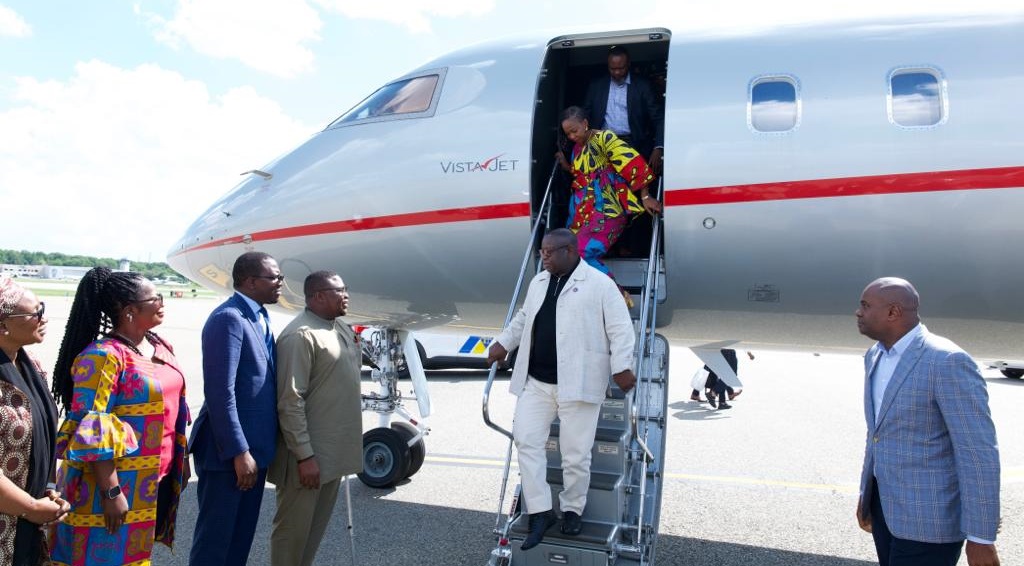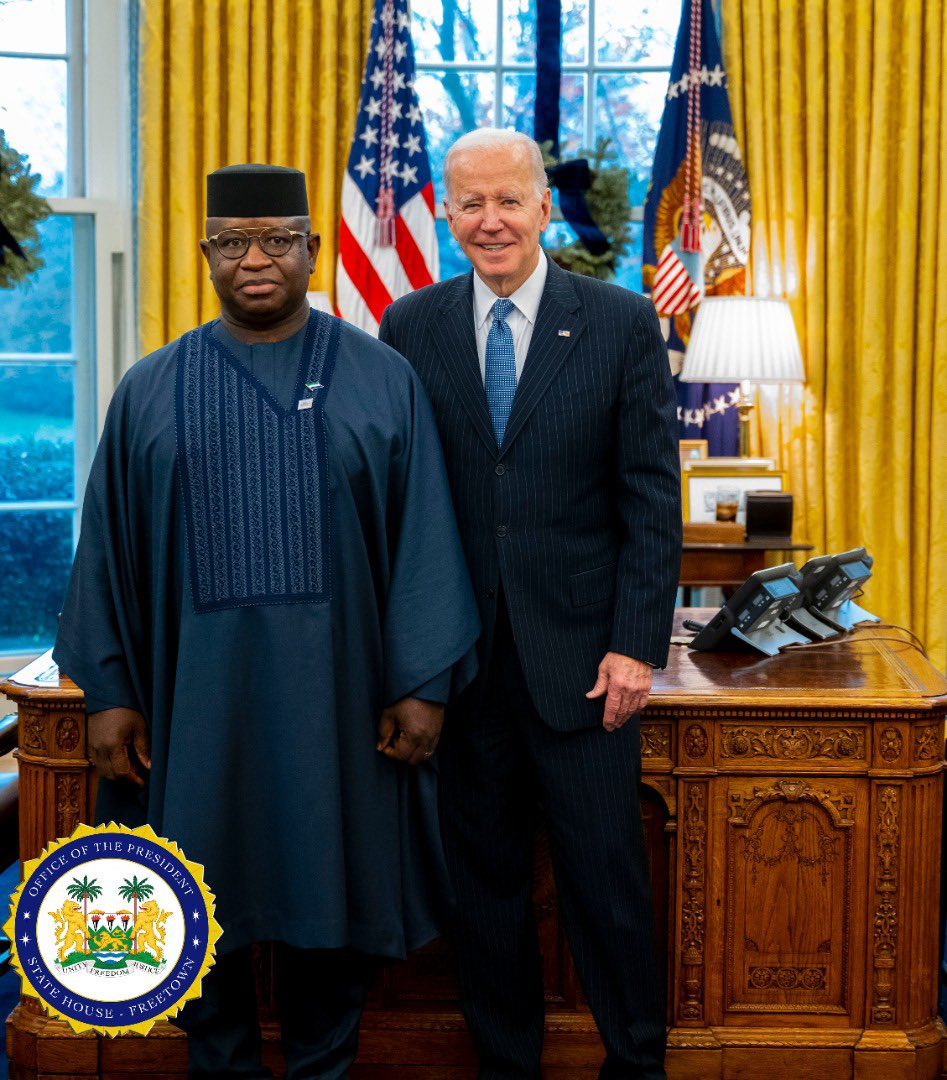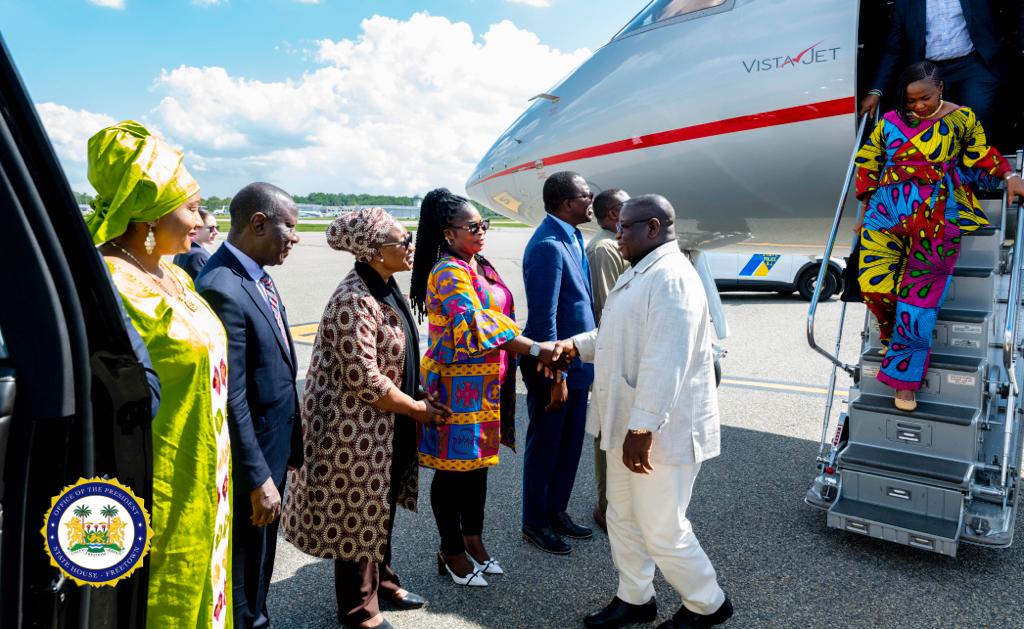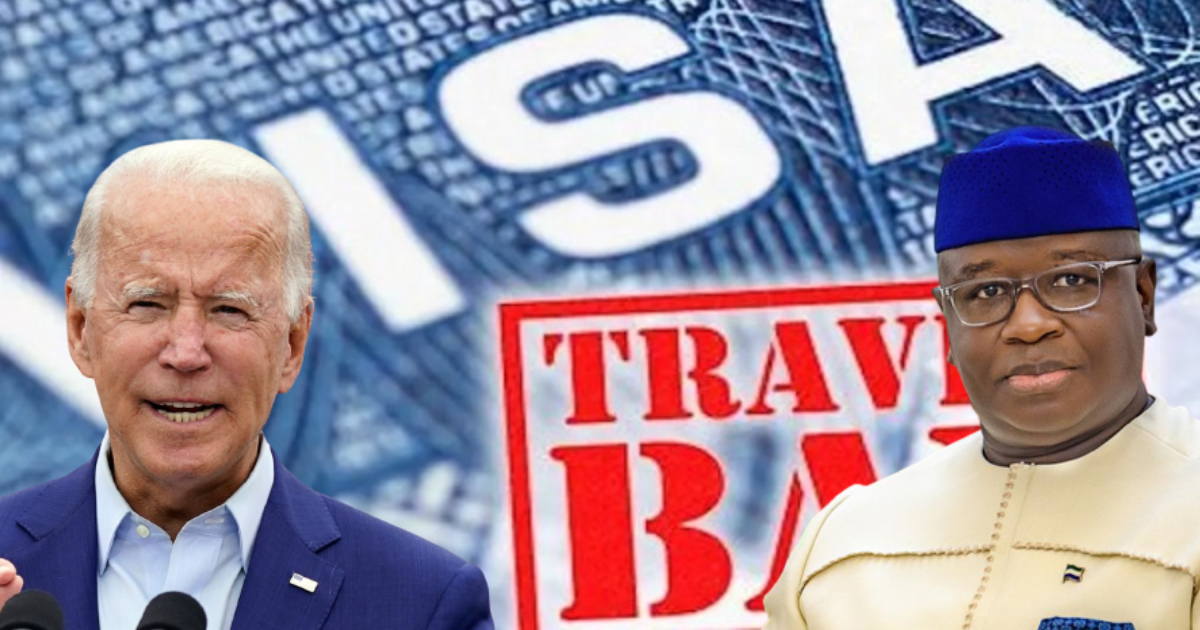On Tuesday, September 12, 2023, Sierra Leone’s President Julius Maada Bio arrived in New York, United States for the 78th session of the United Nations General Assembly (UNGA 78).
Under the theme, “Rebuilding Trust and Reigniting Global Solidarity: Accelerating Action on the 2030 Agenda and its Sustainable Development Goals towards Peace, Prosperity, Progress and Sustainability for All”, the President is expected to proactively engage his colleague Heads of State, Government officials attending UNGA, Heads of International Financial Institutions, Philanthropic Organisations and the media.
Bio will also showcase Sierra Leone’s development strides and highlight his government’s vision for sustainable transformation for the next five years. He will further engage with key stakeholders before the commencement of Sierra Leone’s tenure as a non-permanent member of the UN Security Council for the term 2024-2025.

The President’s arrival to the United States comes just two weeks, after the U.S. Secretary of State, Antony J. Blinken, announced the implementation of a stringent visa restriction policy targeting individuals involved in undermining the democratic process in Sierra Leone.
The announcement follows a disputed presidential election in June which saw incumbent President Julius Maada Bio of the Sierra Leone People’s Party (SLPP) re-elected, defeating Dr Samura Kamara of the main opposition All People’s Congress (APC) Party.
Kamara and the APC have refused to accept the result, describing it as a “daylight robbery”. Many international election observers also highlighted problems with transparency in the tallying process of the election results. National Election Watch (NEW), an election monitoring group that deployed observers in all polling stations across the country also said that the results declared by the ECSL show there are inconsistencies.
According to Blinken, the United States will actively pursue visa restrictions for those deemed responsible for acts that undermine democracy in Sierra Leone. Such acts include manipulating or rigging the electoral process, employing intimidation tactics to deter voters, election observers, or civil society entities through threats or physical violence, as well as violating human rights principles associated with the democratic process in Sierra Leone.

Although details of the individuals targeted by the US visa sanction weren’t immediately made public in the statement issued by the State Department, it is strongly believed that government officials who participated in electoral malpractice in the 2023 general elections might have been included.
Since the announcement of the visa restriction policy, there has been widespread curiosity among Sierra Leoneans about the identities of these individuals. With their names not made public, there is only one way to find out – their ability to travel to the United States.
Earlier this week, a former Minister of Social Welfare, Sylvia Blyden travelled to Washington DC to prove that she is not under a VISA ban. Although Blyden is a member of the opposition APC, she is believed to have strong ties with the First Lady, Fatima Bio and has on several occasions defended the ruling government and its policies.
Upon President Bio’s New York arrival, several government officials were spotted in his delegation, including First Lady, Fatima Bio; Chief Minister, David Moinina Sengeh; Foreign Affairs Minister, Timothy Kabba; Presidential Spokesperson, Alpha Kanu; and the Information and Civic Education Minister, Chernor Bah.

The presence of these officials in the U.S. prompts questions: Are they exempt from visa restrictions, or do they benefit from diplomatic exceptions? According to the U.S. immigrations laws, diplomats and other foreign government officials are eligible to travel to the United States using an A-1 or A-2 visa to engage solely in official duties or activities on behalf of their national government.
Furthermore, there’s no questioning about Maada Bio’s eligibility to travel to the United States as President of Sierra Leone. Under the U.S. immigration laws, the Head of State or Government of any country qualifies for an A visa regardless of the purpose of travel. Based on the foregoing, it can be concluded that the President and officials of the Sierra Leone government are eligible to travel to the United States and immune from visa restrictions until they vacate their position in government.












Please, we all know those who were responsible for all the problems we encountered that the USA are referring to.
The BIOs and other govt officials have proved they are not the ones.
Now, those who were terrorising ECSL, intimidating voters, trying to stop the election etc, should now apply for visa to the USA so we can know those that are on the BANNED list.
Your caption is mischievous and and the assertion are motivated by biad and rancor
Salone man get badheart. It took us as a nation to reach this stage. Everyone knows, how wretched Sierra Leone was was by 2017. Suspended by IMF and world bank. Amongst the rough stage.
The Sierra Leoneans in America, didn’t formulate any demonstration by their own judgment. The reckless behavior of our government that time was all over the place.
Dem people don dae disgrace themselves before the whole world. With fake pictures wae even African intelligence go able prove say, na false. Let alone the American one.
Nigeria, Cameron etc. All get problems with dem elections, but dem choose d right ways.
Salone man em yone petition na western countries.
Maada is now in the US, so let Samura kamara apply for visa now and let see what the outcome will be
The APC only want to distract the Government from working to the satisfaction of the people. Let them return the stolen monies
Don’t be fooled!!
Bio and entourage are not coming to the US. They are coming to the UN and so the US is obligated to issue visas to them. Remember, Libyan leader Gaddafi was also able to attend UN functions in US. Even Iranian former president Mahmoud Ahmadinejad was able to attend UN functions. Do not be fooled thinking because they attended this meeting, they are not on the list.
HARD TO KNOW!!
You people are wasting your time debating about irrelevant topic; ban, ban, visa ban… the west only care for their interest not the people of colors. The early you know that the better for you….
Kaka long tay yay but e mos cut,,
The end go justify?
Sierra Leonean people are in the USA for a UN General Assembly meeting. For this particular meeting every country leader is free to attend. For this UN General Assembly meeting, there are no restrictions on leadership entery to America. It is a General Assembly meeting, so every leader of a
country, whether that country is headed by a junta leader or a democratically elected leader ,as long as you represent a country as a leader; you are allowed to attend and to participate in that meeting.
However, all leaders suspected by the Americans are not allowed outside the meeting house and they must return to their country immediately after the meeting.
In the case of Sierra Leone, the list of names of all the people expected to be under the ban has not been published yet. if the American government would decide to publish it.
It is left with the American government to publish the list or not. The American Ambassador can keep the list in every Embassy waiting for you to come for Visa which they will deny and then stamp your Passport.
For the General Assembly meeting, every leader has a limited number of people he should go with which the UN takes care of.
Please read more to understand issues better. This meeting has nothing to do with Elections Rigging or any other thing.
Break time or Lunch time you can discuss other matters with other people.